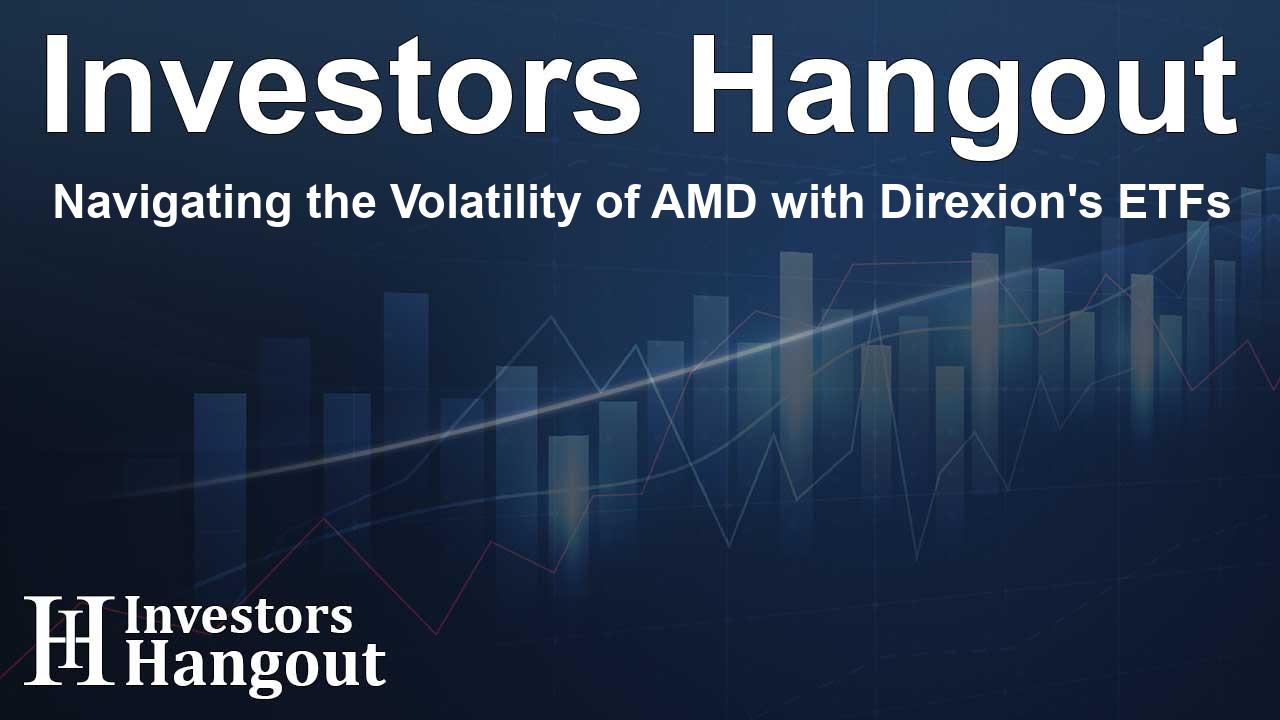Navigating the Volatility of AMD with Direxion's ETFs

The Dynamics of Advanced Micro Devices Inc
Advanced Micro Devices Inc (NASDAQ: AMD) has captured attention in the semiconductor sector with its remarkable strategies, especially amid growing enthusiasm towards artificial intelligence. While excitement over AI advancements is palpable, it has also sparked concerns about a potential market bubble. Despite a strong beginning, AMD's share price faced a decline recently, signaling the unpredictable nature of the market.
A Strong Start to the Year
In a positive light, AMD's stock has soared approximately 78% since the year's start, with a significant uptick of over 35% in the last month alone. These gains are primarily attributed to its groundbreaking partnership with OpenAI, developers of the popular AI-driven ChatGPT. Analysts suggest that this collaboration could unlock a staggering $135 billion in revenues.
Details of the OpenAI Partnership
The deal entails deploying 6 gigawatts (GW) of AMD's powerful GPUs to enhance OpenAI’s expanding infrastructure over the coming years. Interestingly, OpenAI might obtain up to 160 million shares of AMD based on performance milestones related to these GPU deployments.
Market Reactions and Analyst Cautions
As AMD continues to gain ground, Wall Street analysts urge caution. Goldman Sachs warned that heavy reliance on OpenAI could pose a risk for AMD, with estimates suggesting OpenAI might account for over 40% of AMD's revenue by 2027.
Concerns from the Semiconductor Space
Skepticism is growing as market analysts voice concerns regarding an AI valuation bubble. Recently, AMD's stock experienced an almost 8% decline, reflecting the volatility driven by external factors. Nvidia's CEO expressed surprise over AMD's strategic partnership, raising questions about AMD's foresight in granting OpenAI a 10% stake prior to fully realizing the effects of their collaboration.
Introducing Direxion's ETFs
Given the dynamic trading landscape, Direxion has launched exchange-traded funds (ETFs) that allow for easy speculation on AMD's stock fluctuations. The Direxion Daily AMD Bull 2X Shares (NASDAQ: AMUU) aims to track 200% of AMD’s daily price performance, while the Direxion Daily AMD Bear 1X Shares (NASDAQ: AMDD) offers an inverse performance exposure.
The Mechanism of Direxion's Offerings
These ETFs operate on a model that simplifies the processes typically involved in options trading. Instead of navigating complex options markets, investors can engage with Direxion's ETFs through straightforward debit transactions, where the maximum potential loss is limited to the initial investment.
Volatility and Risk Awareness
However, it's essential for potential investors to understand the risks associated with leveraged and inverse ETFs. These funds can exhibit greater volatility compared to traditional funds that mirror broader market indices such as the Nasdaq Composite. Moreover, Direxion ETFs are intended for short-term exposure, with risks of positional decay if held longer than a single trading session.
Performance Insights on the AMUU ETF
Despite challenges, the AMUU ETF has experienced a remarkable gain of around 168% so far this year. Notably, it recently broke through crucial technical levels, indicating strong bullish sentiment. Increased trading volume has also been observed, suggesting renewed interest among investors.
Examining the AMDD ETF
Conversely, the AMDD ETF faced considerable challenges, with a decline of approximately 60% year-to-date. While it showed strength with an 8% rise on a specific Friday, the underlying trend remains negative. Technical analysts highlight the significance of maintaining above critical support levels; the decline below these could prompt further caution among investors.
Conclusion: The Future Ahead
As AMD continues to carve its niche in the semiconductor sector, the intricacies of direct market speculation are matched by the strategic approaches companies like Direxion are implementing to facilitate informed trading. Understanding these developments is vital for investors looking to capitalize on technology's ongoing evolution.
Frequently Asked Questions
What is AMD's recent stock performance?
AMD's stock has rallied approximately 78% this year, experiencing significant fluctuations due to market reactions and partnerships.
How do Direxion's ETFs work?
Direxion’s ETFs allow investors to leverage or short AMD stock with simplified trading mechanics compared to traditional options.
What risks are associated with leveraged ETFs?
Leveraged ETFs are typically more volatile and can lead to greater losses, especially if held longer than one trading session.
What has been the market reaction to AMD's partnership with OpenAI?
The market has reacted positively with initial stock gains, though some analysts have raised concerns over heavy reliance on OpenAI.
What is the current status of Direxion's AMUU and AMDD ETFs?
The AMUU ETF has demonstrated significant growth while the AMDD ETF has struggled, reflecting the contrasting dynamics of AMD's stock performance.
About The Author
Contact Riley Hayes privately here. Or send an email with ATTN: Riley Hayes as the subject to contact@investorshangout.com.
About Investors Hangout
Investors Hangout is a leading online stock forum for financial discussion and learning, offering a wide range of free tools and resources. It draws in traders of all levels, who exchange market knowledge, investigate trading tactics, and keep an eye on industry developments in real time. Featuring financial articles, stock message boards, quotes, charts, company profiles, and live news updates. Through cooperative learning and a wealth of informational resources, it helps users from novices creating their first portfolios to experts honing their techniques. Join Investors Hangout today: https://investorshangout.com/
The content of this article is based on factual, publicly available information and does not represent legal, financial, or investment advice. Investors Hangout does not offer financial advice, and the author is not a licensed financial advisor. Consult a qualified advisor before making any financial or investment decisions based on this article. This article should not be considered advice to purchase, sell, or hold any securities or other investments. If any of the material provided here is inaccurate, please contact us for corrections.
